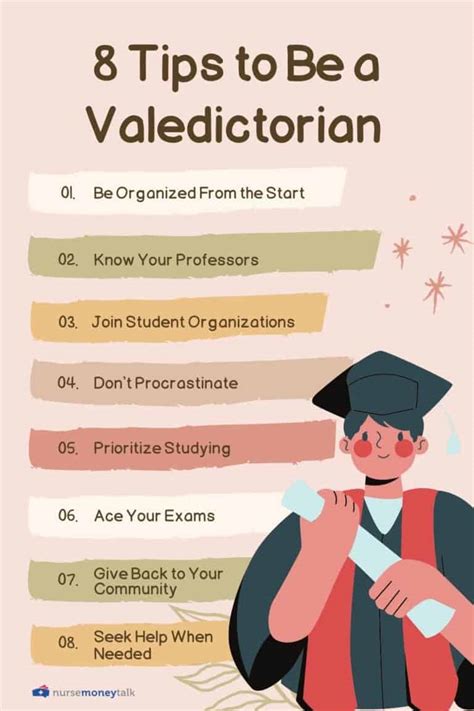As the pinnacle of academic achievement in high school, the honor of valedictorian is highly coveted. To attain this prestigious title, students must not only excel in their studies but also possess a remarkable array of personal qualities and characteristics. Here’s a comprehensive guide to the essential requirements for valedictorian:

Academic Excellence
- GPA: Valedictorians typically maintain an exceptional grade point average (GPA) throughout their high school years. This requires consistent academic effort, dedication, and a knack for mastering complex material. Most schools require a GPA of 4.0 or higher on a 4.0 scale.
- Course Rigor: Valedictorians seek out challenging academic courses, including honors, Advanced Placement (AP), and International Baccalaureate (IB) classes. Taking rigorous coursework demonstrates a commitment to intellectual growth and the pursuit of higher-level knowledge.
Standardized Test Scores
- SAT/ACT: Valedictorians consistently score exceptionally well on standardized tests such as the SAT and ACT. These scores are often taken into consideration when determining valedictorian status, as they provide a standardized measure of academic ability and aptitude.
Leadership and Involvement
- School Activities: Valedictorians play an active role in extracurricular activities and school clubs. They demonstrate leadership skills through positions such as student government officers, club presidents, or captains of athletic teams.
- Community Service: Valedictorians engage in meaningful community service activities that contribute to their school and local area. They actively seek opportunities to give back to their community through volunteering, organizing events, or participating in service projects.
Personal Qualities
- Motivation and Perseverance: Valedictorians possess an intrinsic motivation to succeed and the perseverance to overcome academic challenges. They exhibit a strong work ethic, set ambitious goals, and strive for excellence in all they do.
- Curiosity and Intellectualism: Valedictorians have an insatiable thirst for knowledge and a passion for learning. They actively seek out new intellectual experiences and embrace opportunities to expand their horizons.
- Integrity and Responsibility: Valedictorians embody the highest standards of integrity and responsibility. They are honest, trustworthy, and take pride in their actions. They are role models for their peers and serve as ambassadors for their school.
- Communication Skills: Valedictorians possess excellent communication skills, both written and verbal. They can articulate complex ideas clearly and effectively, and are comfortable speaking in front of an audience.
- Empathy and Compassion: Valedictorians show empathy and compassion for others. They are supportive of their peers and actively work to create a positive and inclusive school environment.
Common Mistakes to Avoid
- Procrastination: Valedictorians understand the importance of time management and avoid procrastination. They plan ahead and allocate their study time effectively.
- Perfectionism: While striving for excellence is important, perfectionism can lead to unnecessary stress and anxiety. Valedictorians find a balance between high expectations and realistic goals.
- Academic Arrogance: Valedictorians recognize their academic achievements but maintain a humble and respectful attitude towards others. They avoid boasting or being dismissive of those who may not excel academically.
- Neglecting Social Skills: Valedictorians prioritize academics, but they also understand the importance of maintaining social connections. They make an effort to participate in extracurricular activities and build meaningful relationships with their peers.
FAQs:
- How is valedictorian determined? Valedictorians are typically selected based on their cumulative GPA and standardized test scores, as well as their involvement in school activities, community service, and personal qualities.
- Can students who transfer schools become valedictorian? Transfer students may be eligible for valedictorian status, but they may need to meet specific requirements related to the number of semesters or years they have attended the school.
- What are the benefits of being valedictorian? Valedictorians enjoy recognition for their academic achievements, have a competitive advantage in college admissions, and may be eligible for scholarships and other awards.
- Is it necessary to be popular to become valedictorian? While popularity can be helpful, it is not a requirement for becoming valedictorian. Valedictorians are selected based on their academic merit and overall contributions to their school and community.
- Can students with learning disabilities become valedictorian? Yes, students with learning disabilities can achieve valedictorian status. Schools often provide accommodations and support to ensure that all students have an equal opportunity to succeed.
- What is the most important factor in becoming valedictorian? Academic excellence is the most important factor in becoming valedictorian. However, extracurricular involvement, community service, and personal qualities also play a significant role.
Conclusion
Becoming valedictorian is a challenging but achievable goal for highly motivated and well-rounded students. By understanding the essential requirements and avoiding common mistakes, students can increase their chances of earning this prestigious honor. Valedictorians not only serve as role models for their peers but also represent the highest ideals of academic achievement and personal excellence.
